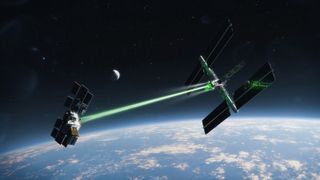Space
Explore Space
Editor's Picks
Latest about Space

James Webb telescope detects alien planet with clouds made of quartz
By Joanna Thompson published
The exoplanet WASP-17b's atmosphere is full of quartz clouds, according to a new James Webb Space Telescope observations.

Oldest radio-wave explosion ever found could be used to weigh the universe, astronomers say
By Ben Turner published
Astronomers traced a mysterious radio source to three merging galaxies 8 billion light-years away. Studying it could help uncover the universe's missing matter.

Scientists finally solve mystery of strongest Marsquake ever detected
By Sharmila Kuthunur published
The strongest recorded Marsquake, which rattled for six hours in May 2022, left no visible traces on the Red Planet surface. Now, scientists think they know what caused it.

Mysterious signals from 'hell planet' 40 light-years from Earth could finally be solved by James Webb Space Telescope
By Paul Sutter published
The hellish super-Earth '55 Cancri e' may be constantly losing and re-growing its atmosphere, a new study of the planet's strange transit signals suggests.

Nearby asteroid may contain elements 'beyond the periodic table', new study suggests
By Sharmila Kuthunur published
Naturally occurring superheavy elements beyond those listed in the periodic table could potentially explain why asteroid 33 Polyhymnia is so dense, new research suggests.

Scientists propose 'missing' law for the evolution of everything in the universe
By Patrick Pester published
The "law of increasing functional information" says that complex systems in nature evolve to become more complex.

Soar through the 'Labyrinth of Night' — a Martian canyon the size of Italy — in thrilling new satellite video
By Briley Lewis published
See Mars' geology up close, thanks to decades of stunning images from the Mars Express satellite, in a new visualization of Noctis Labyrinthus, the 'Labyrinth of Night'.

Ultra-powerful plasma 'blades' could slice entire stars in half, new paper suggests
By Paul Sutter published
Stars could be sliced in half by "relativistic blades," or ultra-powerful outflows of plasma shaped by extremely strong magnetic fields, an unpublished paper claims.
Live Science newsletter
Stay up to date on the latest science news by signing up for our Essentials newsletter.

